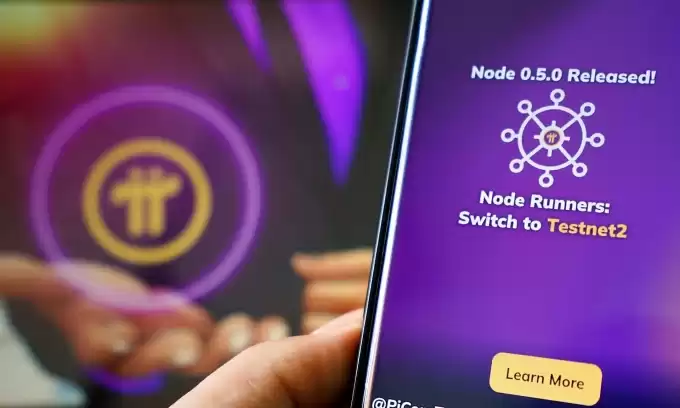 |
|
 |
|
 |
|
 |
|
 |
|
 |
|
 |
|
 |
|
 |
|
 |
|
 |
|
 |
|
 |
|
 |
|
 |
|
Cryptocurrency News Articles
Pre-mining SuperNode distribution raises questions about Pi Network's decentralization promises
Mar 28, 2025 at 07:08 am
An account claiming to represent the team responded, but the answer was criticized for being vague, explaining only the technical role of supernodes without detailing how users could operate them.

A post on Reddit has brought to light some concerns regarding Pi Network, with users reporting a lack of token rewards for several months and skepticism over the platform's decentralization claims.
The post, which was made by a user asking for someone running a Node or SuperNode to explain what it is and share their experience, has sparked a discussion among node operators who say they have not been receiving any Pi token rewards for months.
"I have been running a Pi node for over a year now and I can confirm that I have not received any Pi token rewards for the past 6 months," one node operator wrote.
Another user, who claims to have been operating a SuperNode for the past six months, said they had only received a small amount of Pi tokens in the beginning.
"I am still running my SuperNode and I am not planning to stop anytime soon. However, I am starting to get a bit worried because I have not received any Pi token rewards for the past few months. I am also starting to suspect that only those with insider connections or high-end hardware are able to qualify for the Pi token rewards, which goes against Pi Network's claim of being 'a cryptocurrency for everyone'," the user wrote.
These concerns have also fueled skepticism about whether token distribution is still centrally controlled, undermining decentralization claims.
"I am starting to think that the token distribution is still centrally controlled and that the SuperNode program is just a way to collect data on node operators and siphon off their computing power."
Several users suspect that the lack of token rewards may be due to a technical issue that the Pi Core Team is currently trying to resolve.
"I am sure that the Pi Core Team is aware of the issue and they are working hard to fix it. I am also confident that all node operators will eventually receive the Pi token rewards that they are due."
Earlier reports:
- Ben Zhou calls Pi Network a scam project
- Pi Network mainnet launch sparks mixed reactions
- Pi Network to cooperate with Chainlink for interoperability
Pi Nodes are desktop applications that help create and store Pi.
According to the official website, Pi Node is a program that users can download and run on their computer to contribute to the network and earn Pi tokens.
Unlike the smartphone app, which handles registration, login and daily check-in, Pi Nodes also validate blockchain transactions.
Unlike Bitcoin and Ethereum, which use proof-of-work algorithms that reward computational effort, Pi relies on the Stellar Consensus Protocol (SCP). SCP allows nodes to form "security circles" with trusted peers and validate only transactions approved by others in the group. Nodes are expected to stay online as much as possible to ensure reliability.
The Pi Network mobile app features an introduction to Pi Node version 0.5.0. Photo by VnExpress/Hoang Anh
In an update released in early March, PCT introduced the SuperNode. According to the Pi Network website it is "the backbone of Pi’s Blockchain."
They are responsible for reaching a consensus based on the algorithm to write the right transaction on the Pi ledger, in addition to all the responsibilities that a node performs. They’re also responsible for making sure other SuperNodes and Nodes get the latest state of the blockchain.
SuperNodes also utilize the node interface and are initially selected by the Core Team. They need to be connected to the network 24/7 and have a reliable internet connection.
A new debate has emerged around Pi Network’s SuperNode, with many questioning whether the platform is genuinely decentralized or merely a centrally controlled system, according to CoinPedia.
Unlike Bitcoin and Ethereum, which rely on thousands of independently operated nodes, Pi Network remains under close management by its development team. PiScan data shows that initially only three SuperNodes operated, all run by the core team in Canada and Finland. While that number has grown to 42, transparency remains an issue, with limited information shared publicly.
“With so few validators, decision-making power is limited to a select few, making the network significantly more centralized than its competitors,” Brave New Coin commented.
PiScan data further indicates that 62.8 billion Pi coins are stored in six wallets controlled by PCT, with another 20 billion held across nearly 10,000 unlisted wallets linked to the team. “This means that just a small group of insiders controls the majority of the supply, leaving little room for true decentralization,” Brave New Coin said.
The Pi Network team has not responded to these concerns.
In a series of nine posts on X (formerly Twitter), Justin Bons, founder and CIO of Cyber Capital, openly called Pi Network a scam.
“WARNING: PI is a straight-up scam!” Bons wrote on March 20.
“Offering an ‘MLM’ based ‘mining’ scheme on mobile is a gimmick, as it does not contribute to consensus! PI is fully permissioned (centralized) & everything requires KYC, even
Disclaimer:info@kdj.com
The information provided is not trading advice. kdj.com does not assume any responsibility for any investments made based on the information provided in this article. Cryptocurrencies are highly volatile and it is highly recommended that you invest with caution after thorough research!
If you believe that the content used on this website infringes your copyright, please contact us immediately (info@kdj.com) and we will delete it promptly.
-

-

-

-

-

-

- Here’s Why Analysts Are Calling Coldware ‘SUI 2.0’ – Can This Altcoin Bring Back Confidence in Web3?
- Mar 31, 2025 at 09:00 am
- Coldware (COLD) is shaking up the blockchain world, not with hype, but with hardware, utility, and a roadmap that addresses many of the shortcomings of legacy platforms like Sui (SUI).
-

- Broader NFT market trading sales volume reaches $101.13 million, Courtyard NFT collection emerges as the top-selling collection
- Mar 31, 2025 at 08:55 am
- In another week, the broader NFT market has recorded an increase in trading sales volume, reaching $101.13 million after seeing a surge of 0.84% from the previous week.
-

-




























































